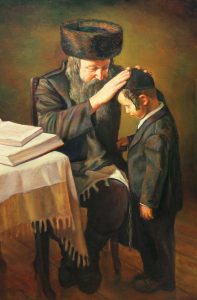Who Killed Eisav and Why & Vayichi Roundup:
Parshas Vayichi features three deaths, two of which are specifically mentioned in the heylige Toirah. Avada and avada, everyone knows that as sefer Bereishis draws to a close, so does Yaakov’s life and the greater part of the parsha is about the brochos (blessings) he bestowed on his kids, some of them, in the last days of his life. Less well known and found towards the very end of the parsha, Yoisef will die. And kimat totally unknown is that in this parsha, though not explicitly mentioned in the heylige Toirah, we will also say a final goodbye to Eisav, Yaakov’s twin brother and sometime arch enemy. Stop and hold the presses! Eisav dies in this parsha? Didn’t we last hear from him when his father Yitzchok passed away a healthy number of parshas (Bereishis 35:29) back? What’s he doing here in Vayichi? Reborn? Hiding in Yeshiva of Shem and Ever? Ober Raboyseyee, if you learn the heylige Gemora as does the Oisvorfer (from time to time) and a few medroshim to boot, you too would know what you’re about to read. Seemingly Eisav was very much alive, according to some, and will finally die and be buried right here in parshas Vayichi. Wait until you hear how.
Lommer lernin ober ershtens, if you want the Oisvorfer’s outlook on all the various brochos that Yaakov gave each of his wonderful and upstanding kinderlach, check out the archives at www.oisvorfer.com where we previously covered this topic biarichus (at great length). This year, as we say farewell to some of our favorite Toirah characters, we’ll pay more attention to the back of the parsha. Let’s set the stage.
Yaakov just finished reminding a few of his kids about their past sins. Though many years have passed, he’s seemingly still quite upset with Reuvain for an unauthorized bed move and mount. With kimat his last breaths, Reuvain is berated for having had epes some illicit relationship with one of Yaakov’s other wives. Shoin, we won’t go any further with this incident; we assume Reuvain did tshuva since. Besides do you want to be reminded about all you questionable bed mountings and improper relationships, if you chap, chazir that you are, for the rest of your life? Veyter. Yaakov is also still smarting over the impetuous behavior of Shimoin and Levi – they of sword wielding fame – which they may have gotten as bar mitzvah presents, and which wiped out a bunch of hapless and seemingly innocent goyim. Of course they also killed the bad guys. He bestows various blessings on the rest of the kids saving his biggest and best for his two favorite sons, Yoisef and Yehuda. He’s ready to die and gives them final instructions about where he wants to be buried. He specifically tells the boys (where was Dina by the way) that he wants to be buried with his forefathers and foremothers. He delineated them by name and it’s the first time we hear anything about Leah having died and where she was buried. And we’ll pick up the action from there. Here we go.
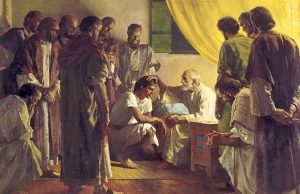 Yaakov’s instructions are to bury him in the Meoras Hamachpela (Cave of Machpela) located in Chevroin. Zicher you recall that zeyda Avrohom paid full price for this cave, though our cousins have long forgotten the sale. Says the heylige Toirah (Bereishis 50: 2-4): Yaakov died! At Yoisef’s orders, Yaakov was embalmed by Egyptian doctors. Embalmed, oy vey! More on that soon. Yaakov is mourned for seventy days by Egypt, including forty days of embalming, for “thus are the days of the embalming fulfilled.” The days of his crying end, and Yoisef requests permission from Paroy to take Yaakov to Canaan. The action picks up a few pisukim later; let’s learn them as well because in the end, we will mamish tie them all together in a tale you will zicher wish to discuss at the shabbis tish; why speak loshoin horo about the shul, your friends and other narishkeyt (bs) when you can learn the heylige Toirah? Veyter in the parsha: Yoisef takes Yaakov’s body to Canaan, and all the elders of Egypt accompany him, as well as his father’s house. Yoisef conducts a mourning ceremony which attracts the attention of the Canaanites, who then call the place “the mourning of Egypt”. Yaakov is brought to the Machpela Cave by his sons, “as he had commanded them”. And…………..
Yaakov’s instructions are to bury him in the Meoras Hamachpela (Cave of Machpela) located in Chevroin. Zicher you recall that zeyda Avrohom paid full price for this cave, though our cousins have long forgotten the sale. Says the heylige Toirah (Bereishis 50: 2-4): Yaakov died! At Yoisef’s orders, Yaakov was embalmed by Egyptian doctors. Embalmed, oy vey! More on that soon. Yaakov is mourned for seventy days by Egypt, including forty days of embalming, for “thus are the days of the embalming fulfilled.” The days of his crying end, and Yoisef requests permission from Paroy to take Yaakov to Canaan. The action picks up a few pisukim later; let’s learn them as well because in the end, we will mamish tie them all together in a tale you will zicher wish to discuss at the shabbis tish; why speak loshoin horo about the shul, your friends and other narishkeyt (bs) when you can learn the heylige Toirah? Veyter in the parsha: Yoisef takes Yaakov’s body to Canaan, and all the elders of Egypt accompany him, as well as his father’s house. Yoisef conducts a mourning ceremony which attracts the attention of the Canaanites, who then call the place “the mourning of Egypt”. Yaakov is brought to the Machpela Cave by his sons, “as he had commanded them”. And…………..
Shoin, we read the text and now let’s learn some heylige Gemora and a few medroshim so that we can chap what may have taken place, at least according to them. Says the heylige Gemora (Soitah 13a) azoy: Chushim ben Don (Don’s son) killed Eisav! When? During Yaakov’s funeral. He did? Who is Chushim and why would he kill Eisav? Soon we’ll address that. Ober says the Yalkut Shimoni (quoting a Chazal), a bombshell mamish: Yaakov himself killed Eisav with an arrow. He did? Ok- we’ll come back to that soon too. And says the Medrish: Yehuda was the real Eisav killer. Is Yehuda in trouble again? Did you read all that? One thing is zicher: Eisav was dead but who killed him? Nu, lommer lernin and let’s try to chap what prompted each of the conspiracy theorists to come up with their suspect. Oh but before we do, one more detail. Those of you that attended yeshiva might recall the rebbe teaching that Eisav’s head was chopped off and that it rolled into the Meoras Hamachpela where it rests comfortably alongside the four couples we accept as being buried there. Efsher we can shed some light on that theory as well. Let’s see.
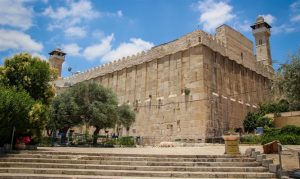 According to the heylige Gemora, Chushim was the hit man, he mamish killed Eisav. Earlier we asked who Chushim was and why he is associated with Eisav’s murder. Says the heylige Gemora: when the brothers (the holy shevotim) arrived at the Meoras Hamachpela to bury their father (Yaakov), Eisav showed up and protested. There was but one remaining plot in the burial cave. Seven had been claimed by Odom, Chava, Avrohom, Soroh, Yitzchok, Rivka and Leah. Eisav stated that the remaining plot belonged to him.
According to the heylige Gemora, Chushim was the hit man, he mamish killed Eisav. Earlier we asked who Chushim was and why he is associated with Eisav’s murder. Says the heylige Gemora: when the brothers (the holy shevotim) arrived at the Meoras Hamachpela to bury their father (Yaakov), Eisav showed up and protested. There was but one remaining plot in the burial cave. Seven had been claimed by Odom, Chava, Avrohom, Soroh, Yitzchok, Rivka and Leah. Eisav stated that the remaining plot belonged to him.
The boys, taken by surprise responded that Eisav forfeited his right to the plot when he sold the birthright for the lentil soup. Ober said Eisav in his counter-claim, azoy: I only sold the pi-shinayim (double-portion) to which a first born was entitled. Nowhere in the sale was it implicit that I was selling my own burial plot! The brothers denied Eisav’s claim and insisted his burial plot was included in the original sale. The brothers claimed that they had paperwork but left it over in Goishen (Egypt). Eisav said he would wait until they retrieved the deed. What to do? Nu, as it turns out, according to legend, brother Naftoli, about whom we knew mamish nothing until now, was a speedster and was volunteered for the mission. Nu, if only he had access to Dropbox or Google Docs. All was good except that Chushim ben [the son of] Don (another brother), who was deaf, asked a few others about the delay and controversy in the burial proceedings. Though impaired, Chushim chapped that his zeyde’s levaya (burial) was on hold pending an administrative issue. Uncle Eisav was holding up the proceedings. Said Chushim “until Naftoli returns from Egypt, my grandfather should lie over there in disgrace?” Chushim took a club and hit Eisav over the head and killed him. Fartig, over and done!
 Says the Medrish (Pirkei D’rebi Eliezer 38 and TargumYoinoson) and who knew better, azoy: with the clubbing, Eisav’s head was severed, and rolled into the cave where it landed in the arm of Yitzchok who “stopped what he was doing (mistama resting) and davened on behalf of Eisav’s soul”: gishmak mamish, one cannot make this up…or, can one? And what’s so gishmak about this version of events? Seemingly, says the heylige Gemora, with this clubbing and murder, the rhetorical question and maybe dire prediction Rivka made many years back came true. Efsher you recall that following the great bichoira sale/caper orchestrated by Rivka (Bereishis27:45) and with an angry Eisav vowing revenge, she sent Yaakov packing but asked: “Why should I lose both of you on one day?” Nu, do you see how the medrish sews things together so beautifully? Mamish gishmak.
Says the Medrish (Pirkei D’rebi Eliezer 38 and TargumYoinoson) and who knew better, azoy: with the clubbing, Eisav’s head was severed, and rolled into the cave where it landed in the arm of Yitzchok who “stopped what he was doing (mistama resting) and davened on behalf of Eisav’s soul”: gishmak mamish, one cannot make this up…or, can one? And what’s so gishmak about this version of events? Seemingly, says the heylige Gemora, with this clubbing and murder, the rhetorical question and maybe dire prediction Rivka made many years back came true. Efsher you recall that following the great bichoira sale/caper orchestrated by Rivka (Bereishis27:45) and with an angry Eisav vowing revenge, she sent Yaakov packing but asked: “Why should I lose both of you on one day?” Nu, do you see how the medrish sews things together so beautifully? Mamish gishmak.
Ober asks the heylige Gemora azoy: how could we suggest that Rivka’s prophesy came true when we already know that Yaakov died 70 days earlier and Eisav only at the funeral? What’s pshat? Not to worry because the Gemora knows mamish everything and this as well. We can say that Rivka was still right: why? Because they were both buried on the same day. Shoin and let’s go veyter.
Says the heylige Gemora – this time the Yirushalmi version (Kesuvois 1:5, Gittin 5:7) azoy: Yehuda killed Eisav! Not because uncle Eisav was holding up the proceedings but while saving his father Yaakov, soon we’ll expound. And says the Medrish Tehilim 18:32 quoting the Novee (Shmuel II 22:41): Yehuda killed Eisav at Yitzchok’s funeral. Grada (so happens) that the timing of his death coincides with Eisav’s last physical appearance in the Toirah. What taka happened? Seemingly, the gantze mishpocho was in the cave davening and crying over the loss of Zeyda Yitzchok. Ober to give Yaakov some time and space alone, the boys left the cave. Eisav snuck in, planning to fulfill his own vow of killing Yaakov around the time of his father’s death. Yehuda saw him, followed him into the cave, and killed Eisav from behind to save his father’s life. Sounds more than plausible and in line with Yaakov’s words to Yehuda. “Your hand attacks the back of the neck of your enemy” (49:8). Shoin: we have two credible suspects ober who did it? Ver veyst? Let’s go further. Says the Yalkut Shimoni (108): it was taka Yehuda but not at Yitzchok’s levaya. Instead, he killed him much later at another family funeral. Seemingly, Eisav launched an assault against Yaakov and his family at the time when Leah passed away and the entire family was grieving. Yehuda led his brothers to a victorious battle against Eisav and his followers, and during this battle Yehuda killed his uncle. Finally, says yet another Yalkut Shimoni quoting Chazal: Yaakov himself killed Eisav with an arrow! Why was Yaakov playing with a bow and arrow? Let’s not forget that he attended -so says the medrish- the famous yeshiva of Shaim and Ever. Anyone who went to yeshiva, zicher knows that back then, Lag Bo’oimer was marked by a day in the park with one’s rebbe and where everyone got to play with their own bow and arrow. Did Yaakov accidentally kill Eisav with his? The bottom line: who killed Eisav? When, where and how? Ver veyst?! Maybe it was lag-b’oimer time, ver veyst.
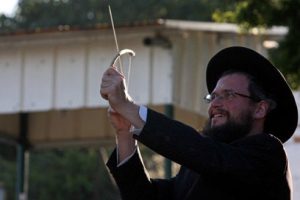 As we stated above, we will stick to the back of the parsha where another interesting concept is explored: ‘the white lie’. Following Yaakov’s passing, but before Yoisef will pass, there will be but two Toirah-mentioned brief exchanges between Yoisef and his brothers. The brothers became a shtikel nervous that Yoisef will finally exact revenge for their mistreatment of him years earlier. And who can blame them or him? Seemingly, revenge is not a new concept here in Sefer Bereishis. Avada you will recall that following Yaakov’s machinations and manipulations to outsmart Eisav form his birthright; he threatened to wait until after his father passed away to even the score with his deceitful sibling. Even if you don’t recall, we mentioned this just one paragraph above. Seemingly, revenge, runs in the mishpocho; what to do? They sent Yoisef a message stating that before Yaakov died, he wanted Yoisef to forgive his brothers for any misdeed. Let’s learn innaveynig:
As we stated above, we will stick to the back of the parsha where another interesting concept is explored: ‘the white lie’. Following Yaakov’s passing, but before Yoisef will pass, there will be but two Toirah-mentioned brief exchanges between Yoisef and his brothers. The brothers became a shtikel nervous that Yoisef will finally exact revenge for their mistreatment of him years earlier. And who can blame them or him? Seemingly, revenge is not a new concept here in Sefer Bereishis. Avada you will recall that following Yaakov’s machinations and manipulations to outsmart Eisav form his birthright; he threatened to wait until after his father passed away to even the score with his deceitful sibling. Even if you don’t recall, we mentioned this just one paragraph above. Seemingly, revenge, runs in the mishpocho; what to do? They sent Yoisef a message stating that before Yaakov died, he wanted Yoisef to forgive his brothers for any misdeed. Let’s learn innaveynig:
15. And when Yoisef’s brethren saw that their father was dead, they said: ‘It may be that Yoisef will hate us, and will fully requite us all the evil which we did unto him.’
- And they sent a message unto Yoisef, saying: ‘Thy fatherdid command before he died, saying:
- So shall ye say unto Yoisef: Forgive, I pray thee now, the transgression of thy brethren, and their sin, for that they did unto thee evil. And now, we pray thee, forgive the transgression of the servants of the God of thy father.’ And Yoisef wept when they spoke unto him.
Says Rashi: following the funeral, Yoisef’s friendly demeanor changed and he stopped inviting the brothers for dinner. Ober says the medrish (Bereishis Rabba) azoy: Reb Yitzchok suggests that on the way back to Canaan to bury Yaakov, Yoisef made a pit stop. This visit was to the real pit that the heylige brothers threw him into years earlier. The brothers were there as well. Of course they were nervous that his memory of that day would reawaken his anger. Hence, they sent a message suggesting that Yaakov asked that he, Yoisef, forgive them.
Ober says the heylige Gemora (Yevomis 65b): that’s not true! What’s not true? In fact, a careful reading of the pisukim confirms that Yaakov never said that or anything like that. Yaakov never asked that Yoisef forgive the boys. Are we suggesting that the shevotim, the holy brothers, tzadikim that they were, future tribe leaders, would again lie to their brother, that very same brother who showed only kindness and mercy? We are! Ober not to worry because says the heylige Gemora: relax! The holy brothers acted upon a famous halachically sanctioned principle of, מותר לשנות מפני השלום “mutar le-shanois mipenei ha-shalom,” or, in plain English: one is allowed to lie mamish -speak untruthfully- for the sake of maintaining peaceful relations among people. Seemingly the truth isn’t always emes (whatever that means). In other words there could be a version of the truth that is only true in the eyes of the beholder. A few months back, the Oisvorfer wrote a speech for a chaver who was speaking at a sheva brochos. It so happened that the kallah wasn’t a beauty, in fact, let’s say that her other qualities ranked much higher. Ober in the speech, the Oisvorfer wrote that the kallah was both beautiful and gracious. The chaver who had to read the speech sent it back redlined asking why these words were written when it was quite clear that the kallah was no beauty. Ober, recalling what one of everyone’s favorite Gemora characters, Hillel once said, the Oisvorfer quoted as follows: one should always say at a wedding, “The kallah is beautiful and gracious.” But what if she isn’t, asked Shammai? Will you tell a lie? In the eyes of her husband, she is beautiful, answered Hillel. Shoin: case closed! The emes isn’t always true but neither is a lie always not emes. There is such a thing as truth in the eye of the beholder. Seemingly, when it comes to relations, lying might be acceptable, if you chap.
And there’s even more good news: the lying by the brothers got the job done! In fact, most commentators don’t have a problem with this particular instance of lying, precisely because it produced the desirable result: peace between the brothers. So is lying a good thing? Nu, le’oillom (in general) the heylige Toirah condemns lying and so we are told with the following quotes: “You shall not bear false witness” (Shmois 20:13); “Keep far from a false matter” (Shmois 23:7); “Neither shall you deal falsely nor lie to one another” (Vayikra 19:11). Ober one could argue that these mitzvois have a juridical context- that is, witnessing and legal testimony. In other words, the emes seems to be better but not all the time. Seemingly, according to Rashi and others, the emes in itself is not the ultimate value; peace and human dignity may in certain instances be a higher value, especially at home with the eishes chayil, if you chap. Let’s chazir; in certain extraordinary circumstances, it is seemingly permissible to “fudge” the truth or even lie in order to achieve peace, reconciliation, or human dignity. And to close this subject, listen to this givaldige and gishmake thought. We just established that one may lie a shtikel for sholom- peace ober why? Nu, “Sholom” is understood according to the kabbalists, to be one of the names of the RBSO, and thus we do not condemn Yoisef’s brothers for bending the truth for the sake of life and peace. They were merely emulating the ways of the RBSO.
Of course you’re all mistama delighted to hear this amazing principle and it’s seemingly the only principle you’ve been strictly adhering to, chazerim that you are. Of course one cannot rely on this principle when seeking a piece, if you chap. Some say that bi’di’eved (as a last resort) one can rely on this principle to make peace after chapping the piece. Seemingly, In the interest of winning Yoisef’s favor and keeping sholom bayis (family peace), the brothers took the liberty of falsely reporting that their father had ordered him to forgive them. Now would be a good time to open the heylige Gemora (Yevomois 62) which will list this incident among the cases in Tanach where dishonesty for the sake of maintaining harmony is acceptable, and even required. Shoin, if lying under certain circumstances might be a mitzvah, it’s zicher one that you keep diligently.
Avada the Oisvorfer was very excited to read this Gemora which is of course referenced by Rashi, who else, but took notice that Rashi’s language does not exactly match that of the heylige Gemora. Adds Rashi “for Yaakov had not commanded this, since he had not suspected Yoisef.” The reason why Yaakov had not issued this command, Rashi explains, is that Yaakov had never suspected Yoisef of harboring any vengeful desires with regard to his brothers. Whether Yaakov knew or didn’t is hotly debated. Though many years had passed and the family now unified and reconciled, seemingly the boys, tzadikkim that they were, never mentioned their ill advised treatment of their brother Yoisef to their father. They never fessed up: the big lie continued. Nu, efsher we can kler that they were relying on this very principle of lying to keep the peace. On the other hand, a good number of other sources continue to insist that Yaakov never found out what the brothers did. As proof they point to Yaakov’s long memory when it came to chastising Reuvain, Shimoin and Levi on his deathbed. Seemingly Yaakov was not shy and knew how to express himself; if only he had really known…………
Nu, efsher reading all about Yaakov and his sons and whether Yaakov did or didn’t know what the brothers had done to his favorite son, efsher you’re still klerring azoy: why didn’t Yaakov wonder how Yoisef had survived and how he got to be promoted to viceroy of Egypt? Furthermore, did Yoisef ever tell this story to his father? If not, why not? Taka excellent kashas.
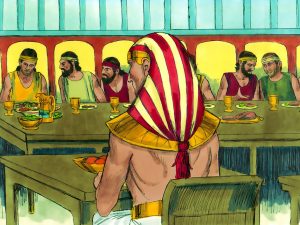 Ober says the medrish (Pesikta Rabati) so gishmak azoy: Behold, all of Yoisef’s praiseworthiness consisted of the great respect he paid his father, yet he did not visit him frequently. For were it not for the fact that others came to tell him, “Your father is ill” (Bereishis 48:1), he would not have known. Was Yoisef a bad son? Farkert! Seeming, he was a givaldige son! According to this medrish, Yoisef avoided long and frequent visits with this father so that Yaakov would not have an opportunity to ask Yoisef what the scoundrels…err; we meant holy brothers did to him. Had Yaakov known, surely he would have remembered to curse them out on his deathbed. He didn’t forget about Reuvain, Shimoin and Levi; Interesting pshat. Moreover, this pshat could also answer a question we discussed last week: why didn’t Yoisef contact his father after he had the means to do so? Again we can suggest that Yoisef, the real tzadik, an appellation well deserved, wanted to avoid ratting out his brothers to this father. Gishmak, mamish!
Ober says the medrish (Pesikta Rabati) so gishmak azoy: Behold, all of Yoisef’s praiseworthiness consisted of the great respect he paid his father, yet he did not visit him frequently. For were it not for the fact that others came to tell him, “Your father is ill” (Bereishis 48:1), he would not have known. Was Yoisef a bad son? Farkert! Seeming, he was a givaldige son! According to this medrish, Yoisef avoided long and frequent visits with this father so that Yaakov would not have an opportunity to ask Yoisef what the scoundrels…err; we meant holy brothers did to him. Had Yaakov known, surely he would have remembered to curse them out on his deathbed. He didn’t forget about Reuvain, Shimoin and Levi; Interesting pshat. Moreover, this pshat could also answer a question we discussed last week: why didn’t Yoisef contact his father after he had the means to do so? Again we can suggest that Yoisef, the real tzadik, an appellation well deserved, wanted to avoid ratting out his brothers to this father. Gishmak, mamish!
Did you notice the headline that Yaakov was embalmed? Is this the Yiddishe way? Says the heylige Toirah (Bereishis 50:2) “And Yoisef commanded the physicians to embalm his father.” Efsher you are wondering how Yoisef could instruct the Egyptian doctors to embalm his father? What’s p’shat here? Nu, let’s see what our wise ones had to say about this gantze myseh (entire story), efsher the only case of embalmment in the gantze Toirah.
Said Reb Meir Leibush (the Malbim): “the purpose of the burial ceremony is to enable the dead person’s body to turn to dust.” Embalming does not allow nature to take its course. And the question is how could Yoisef allow this and even instruct that this take place? Gishmak, same question the Oisvorfer just asked. We are mystified by Yoisef’s request to embalm his father’s body; after all, before he died, Yaakov instructed Yoisef to bury him in the tomb of the patriarchs and matriarchs in Chevroin. Did he mention embalming anywhere? Not to worry because says the Ohr Hachaim, azoy: Yoisef shows great respect for his father because the embalming procedure is reserved for honorable citizens and for pharaohs. Or perhaps Yoisef feared the Egyptians might misunderstand a refusal to embalm Yaakov’s body – they might think he is not dead or that his corpse does not need embalming because it emits no odor? Moreover, it appears, according to some, that Yoisef also feared that the Mitzrim might decide to worship Yaakov as a god and for all the above reasons, Yoisef called an audible and had Yaakov embalmed. Settled? Not!
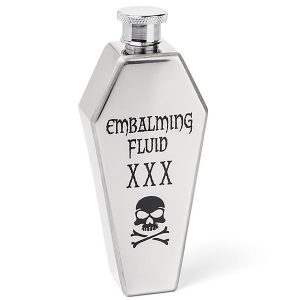 Of course not all agree that Yoisef did the right thing and taka said Reb Yehuda Hanosi -he the author/editor of the Mishnah, azoy: Yoisef sinned when he instructed the Egyptians to embalm his father’s body: “Why does Yoisef die before his brothers? Because he has embalmed his father – which is against Halacha. According to Rabbi Yeudah, Yoisef tried to fight the normal biological process we undergo of returning to dust as our bodies decompose.
Of course not all agree that Yoisef did the right thing and taka said Reb Yehuda Hanosi -he the author/editor of the Mishnah, azoy: Yoisef sinned when he instructed the Egyptians to embalm his father’s body: “Why does Yoisef die before his brothers? Because he has embalmed his father – which is against Halacha. According to Rabbi Yeudah, Yoisef tried to fight the normal biological process we undergo of returning to dust as our bodies decompose.
The Abarbanel describes the embalming procedure azoy: several vital organs were removed, then the body was filled (inside and out) with fragrant oils, and then the fluids were drained from the body. The oils were replaced during each of the 40 day embalming process after which the body was dried of its fluids and could therefore be preserved. Ober is this kosher?
Ober not to worry because says The Zoihar and of course we never mess with the Zoihar, azoy: Yaakov’s body was not embalmed in the traditional fashion. Rather, the body was repeatedly smeared with fragrant oils, and this sufficed to preserve it. There was no organ removal. Ober the Chasam Soifer (responsa, Y.D. 336) does mess with the Zoihar and asks how the smearing of oils would prevent the decay caused by the refuse inside the body. Ober listen to this amazing chidish: He says that what happened was this: before passing away, Yaakov was stricken with a digestive disease which drained his body of all its waste products and without waste, smearing the body was an effective means of preservation. Shoin and settled! As an aside, if you have the same, call the Oisvorfer’s chaver, Dr. Jay Fenster 516-374-0670.
Ober say the Rabonon (other rabbis): Yaakov commanded Yoisef to embalm him. Yoisef just followed his orders. Moreover, the medrish makes it clear that even according to Reb Yehuda Hanosi, there is nothing wrong, per se, with embalming a Jew’s body; it was only a sin here because we believe that the body of a tzadik gomur does not decay (Baba Metzia 84), and by embalming Yaakov, Yoisef implied that Yaakov was not a tzadik gamur (100%) and that there was a need to preserve his body. By embalming him, Yoisef showed that he felt Yaakov was not wholly righteous. That is why he was punished. Yoisef did die at 110 years of age, before his brothers. One more point: Yoisef too was embalmed.
Finally, says the Toisfis Yom tov (Psachim 4:9) azoy: neither cremation nor mummification is assur; both are muttir (OK). Does everyone agree? Of course not!
And as we close Sefer Bereishis, it is quite clear the RBSO selected a few for stardom. The big winners were Avrohom, Yitzchok, Yaakov, and maybe the biggest of all, Yoisef. Not only does the Toirah focus on him, but the Shechina (the RBSO’s divine presence) wandered with him, hovered over him and wherever Yoisef went, we are told that the RBSO watched over him and granted him success in all his endeavors. Even in prison.
Moreover, while Yoisef was not granted prophecy powers, as were the heylige Ovois , he had the power to dream and to interpret dreams. The latter skill, clearly a gift from the RBSO, saved his life, that of his immediate family and also the lives of millions of Egyptians that survived due to his dream management skills. Yoisef, through his dreams, did somehow receive and understands messages about the future. Moreover, his two sons, Ephraim and Menashe, were counted as Yaakov’s sons. He did ok for himself and remains one of the most likable Toirah characters.
A gittin Shabbis-
The Heylige Oisvorfer Ruv
Yitz Grossman

